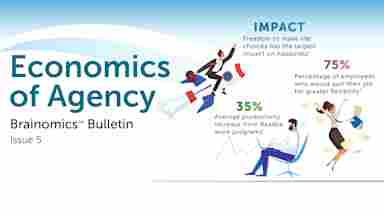Brainomics of Agency
Brainomics Issue 5 Open Printable PDFAgency is the ability and belief that one can control their own life. In the workplace, it means the freedom and choice over the "where," "what," "how," "why" and "when" of work. We are guessing that pretty much everyone reading this Bulletin highly values their agency. And this guess is backed up by the Gallup World Happiness Report – the freedom to make life choices has the highest correlation to individual happiness.1This is consistent with neuroscience. Agency is linked to many brain health benefits: activation of reward systems (think dopamine), fostering positive emotions, increasing cognitive control, reducing stress. So agency makes us happy. But does agency have an economic impact? Two important data points suggest that the more agency an employee exercises, the more productive they become.One reason WFH is so popular (besides saving commuting time as well as lunch and gas money) is the ability to organize the demands of the job to fit with one’s life, including doing the high cognitive load tasks at peak performance time. A second data point draws from new corporate autonomy programs – Google, Patagonia, and others give people time to work on what they want (as much as 20%).2 Does it make economic sense? Well, at Google, this 20%-time investment is where 50% of their highest revenue-generating products have originated. A final thought – as AI takes over routine tasks, the greatest value humans will add is deep work requiring intense concentration and innovation. But this is not easy to produce on demand, so we expect to see an increasing connection between personal agency and economic output.
“”





